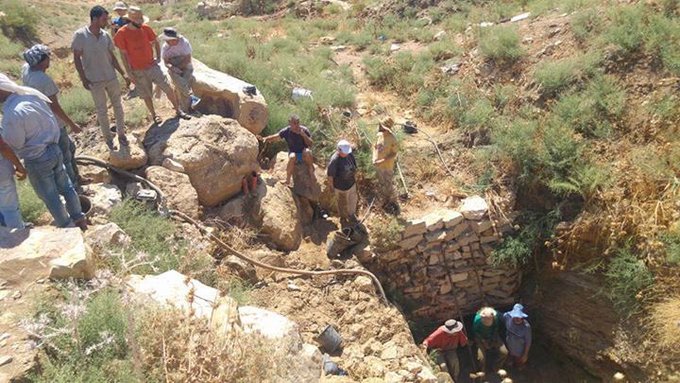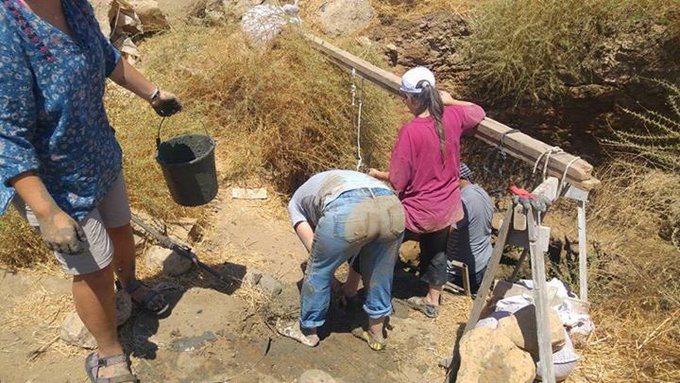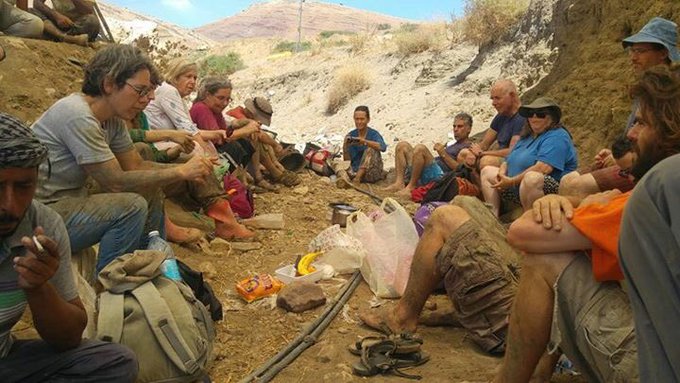An Israeli appeals court has upheld the manslaughter conviction of Elor Azarya, the Israeli soldier whose brutal execution-style slaying of a wounded Palestinian was captured live on video. The court reportedly also has upheld his 18-month sentence.
The ruling was handed down on Sunday. According to
Ma’an News:
The judges voted three to two in favor of upholding the sentence.“The punishment is on the lower edge of appropriate sentencing,” the judges noted, while lamenting that “such an excelling soldier committed such a terrible error.”
The decision is being widely reported in the mainstream media. The New York Times, CNN, and others are carrying stories on it, and one might suppose Zionist trolls may start posting thousands of comments on websites touting it as proof that Israel is “the only democracy in the Middle East” with a model justice system fair to one and all and second to none.
But of course, what the
video shows would probably not be viewed as an act of “manslaughter” by most of us. And oh yes, by the way, manslaughter is
defined as:
the unlawful killing of another person without premeditation or so-called “malice aforethought” (an evil intent prior to the killing). It is distinguished from murder (which brings greater penalties) by lack of any prior intention to kill anyone or create a deadly situation.
The presumed absence of premeditation and “malice aforethought” would seem to be almost ludicrously undermined by the testimony of witnesses, for as we read in the Ma’an report:
Al-Sharif was shot and seriously wounded after allegedly stabbing another Israeli soldier, and after he was left bleeding on the ground for some ten minutes, Azarya shot him in the head, with a number of witnesses quoting him as saying “This dog is still alive,” and “This terrorist deserves to die” before he pulled the trigger.
Do such statements as “the dog is still alive” and “the terrorist deserves to die” really point to a lack of malice? Hardly. And indeed, the report goes on to note that some people, including human rights groups, have described the killing as an “extrajudicial execution.”
Moreover, the comment by the judges that “the punishment is on the lower edge of appropriate sentencing” would thus seem to be an almost phantasmal understatement.
But of course, the Israeli court system only found Azarya guilty of manslaughter, so I guess we can’t legally call him a murderer. Technically speaking, he’s only a “manslaughterer.”
Is it possible the “lower edge of appropriate sentencing” and the conclusion that the defendant had committed nothing more than a “terrible error” had anything to do with the fact that Azarya is Jewish and his victim was Palestinian? Perish the thought, the trolls will probably tell us.
The manslaughterer’s lethal bullet was fired directly into the head of 21-year-old Abdul Sharif. On the day in question, Sharif and a companion, Ramsi Qasrawi, also 21, allegedly stabbed another Israeli soldier, causing minor injury. Both were shot on the spot. Qasrawi died instantly, but Sharif was left alive, though lying in the street in a pool of blood. It was at this point that Azaria stepped forward, cocked his weapon, and fired.
The
New York Times article on the court ruling quotes one of the judges, a Major-General Doron Piles.
“The I.D.F. is the organized military of a country that operates according to law,” Piles said. “Soldiers must not settle accounts with terrorists after the danger from them has passed.”
The major-general obviously believes Sharif and Qasrawi were “terrorists,” and that’s probably the consensus of most Israelis, the New York Times, and much of the rest of the media as well. But of course, we should keep in mind that this shooting took place in Hebron.
Hebron is located in the West Bank, which is internationally recognized as occupied territory.
Under international law, people have a right to resist occupation. So is it “terrorism” when two young men living under an illegal occupation carry out a stabbing of an occupation soldier–or is it an act of resistance? Don’t ask the Israeli court system, the New York Times, or the trolls for that matter. I doubt any of them are capable of giving an impartial and judicious ruling on that matter.
Several days ago, I put up a
post reporting that Azarya was to be transferred to house arrest. Under the terms of this transfer he he would be “required to remain at his parents’ home in Ramle in central Israel and can attend Shabbat services in a synagogue on Friday night and Saturday if he is accompanied by a family member,” as a news report I quoted put it.
A little bit more on the house arrest can also be found in the Ma’an News report:
The court highlighted that Azarya, who was transferred to house arrest earlier this month to wait out the appeals process, had “never expressed remorse or questioned his actions” as one of the main reasons for not lowering his sentence.
Israeli newspaper Haaretz said that Azarya, who has only served nine days behind bars and has spent most of his detention confined to a military base, was expected to be transferred to military prison if the sentence was upheld.
However, Haaretz reported that Azarya’s legal team could take a number of further steps to seek to evade the sentencing.
Azarya’s lawyers could take the case to the Israeli Supreme Court to request that the former soldier’s sentence be postponed for a second time, seek a sentence reduction from the Israeli army chief of staff — a move which would only be available if Azarya publicly took responsibility for his actions, or request a pardon from Israeli President Reuven Rivlin.
So in other words, the manslaughterer will presumably remain under house arrest until the appeals process is exhausted.
Additionally, the New York Times informs us that a pardon may be in the offing as well:
Mr. Azaria could try to pursue a further appeal to Israel’s Supreme Court.
But Israel’s hard-line defense minister, Avigdor Lieberman, urged the Azaria family instead to request a pardon from the chief of staff of the military, Lt. Gen. Gadi Eisenkot, “in order to bring this episode to an end as quickly as possible for the good of Elor, the family and Israel.”
General Eisenkot said Sunday that if Mr. Azaria chose to file a request to lighten his sentence, he would give it “careful consideration.”
Perhaps Eisenkot, in giving “careful consideration” to the matter, will reach the conclusion that the law, perhaps because of the release of the video, was selectively enforced in Azarya’s case. Interestingly, the defense put forward just that argument–that Azarya had been unfairly targeted and as a result he had become a victim of “selective enforcement of the law.” It would seem to be a true statement. Many have of course talked of a “culture of impunity” that seems to pervade the Israeli forces, and Ma’an notes that in the year 2016, Azarya was the only Israeli soldier to be charged with killing a Palestinian–a year in which 109 Palestinians were killed by either Israeli forces or settlers.
Whatever else may be its deficiencies, there doesn’t seem to be a shortage of manslaughterers in the self-proclaimed Jewish state.
I’ll close here with an assortment of tweets that have been posted in the last 24 hours or so. WYSIWYG. I can’t offer much information about them other than that, but some of the videos are rather interesting, and I most assuredly doremember Huda, the young Palestinian girl whose father and other members of her family were killed on a Gaza beach a number of years ago.




















No comments:
Post a Comment